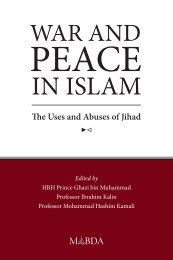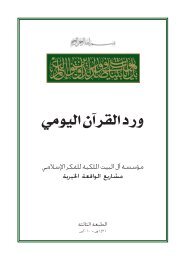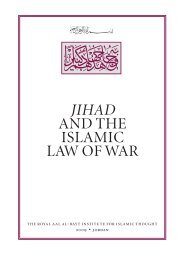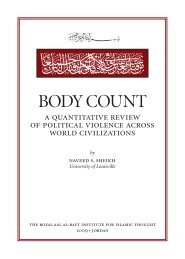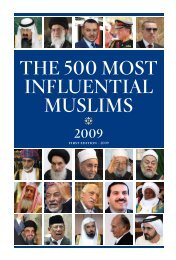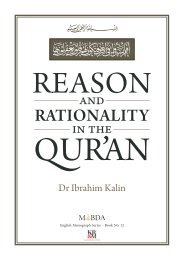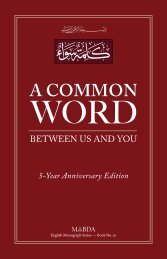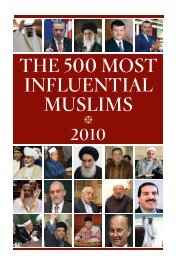the 500 most influential muslims - The Royal Islamic Strategic ...
the 500 most influential muslims - The Royal Islamic Strategic ...
the 500 most influential muslims - The Royal Islamic Strategic ...
Create successful ePaper yourself
Turn your PDF publications into a flip-book with our unique Google optimized e-Paper software.
IIIb. islamic fundamentalism<br />
muslim bro<strong>the</strong>rhood<br />
<strong>The</strong> Muslim Bro<strong>the</strong>rhood, or Al Ikhwan<br />
Al Muslimeen is a transnational Sunni<br />
movement, with no particular ideological<br />
adherence. It is <strong>the</strong> largest political<br />
opposition organization in many Arab<br />
states, particularly in Egypt where it was<br />
founded in opposition to colonial rule<br />
by Hassan al Banna in 1928.<br />
Al Banna originally sought to revive<br />
Muslim culture from its position of<br />
exploitation under colonial rule, through<br />
charitable and educational work, to bring<br />
Islam into a central role in people's life.<br />
Sayyid Qutb (1906-1966 CE) was also a<br />
leading member of <strong>the</strong> Egyptian Muslim<br />
Bro<strong>the</strong>rhood in <strong>the</strong> 50s and 60s.<br />
sunni<br />
shi‘a<br />
revolutionary shi'ism<br />
wahhabism/salafism<br />
Wahhabism/Salafism are terms used<br />
interchangeably to refer to a particular<br />
brand of Islam. Salaf, meaning<br />
predecessors, refers to <strong>the</strong> very early<br />
practice of Islam by Muhammad and<br />
his immediate successors. Salafism<br />
seeks to revive <strong>the</strong> practice of Islam as<br />
it was at <strong>the</strong> time of Muhammad and<br />
can be critical of too much emphasis<br />
being placed on thinkers from after this<br />
period. Muhammad ibn ‘Abd al Wahhab<br />
(1703-1792 CE) was an important figure<br />
in <strong>the</strong> resurrection of this ideology<br />
<strong>the</strong>refore Salafism is often simply known<br />
as Wahhabism.<br />
Revolutionary Shi'ism is an ideology, based on <strong>the</strong> teachings of <strong>the</strong> late Ayatollah<br />
Ruhollah Khomeini (1902-1989 CE), which shares many similarities with Marxist<br />
revolutionary thought. Khomeini believed that <strong>the</strong> only way to secure independence<br />
from colonial or imperial forces was through <strong>the</strong> creation of a Shi‘a state, under <strong>the</strong><br />
idea of Velayat-e Faqih (Guardianship of <strong>the</strong> Jurist). This means that all politics is<br />
subject to <strong>the</strong> opinion of <strong>the</strong> Supreme Leader who is responsible for <strong>the</strong> continued<br />
success of <strong>the</strong> revolution. It is only practiced in Iran.<br />
IIIc. islamic modernism<br />
<strong>Islamic</strong> modernism is a reform movement started by politically-minded urbanites with<br />
scant knowledge of traditional Islam. <strong>The</strong>se people had witnessed and studied Western<br />
technology and socio-political ideas, and realized that <strong>the</strong> <strong>Islamic</strong> world was being left<br />
behind technologically by <strong>the</strong> West and had become too weak to stand up to it. <strong>The</strong>y<br />
blamed this weakness on what <strong>the</strong>y saw as 'traditional Islam,' which <strong>the</strong>y thought held<br />
<strong>the</strong>m back and was not 'progressive' enough. <strong>The</strong>y thus called for a complete overhaul<br />
of Islam, including—or ra<strong>the</strong>r in particular—<strong>Islamic</strong> law (sharia) and doctrine (aqida).<br />
<strong>Islamic</strong> modernism remains popularly an object of derision and ridicule, and is scorned<br />
by traditional Muslims and fundamentalists alike.<br />
17



